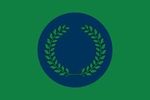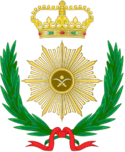Shorewell
Shorewell | |
|---|---|
| Motto: Where everything goes well | |
| Anthem: Mere Watan Yeh Aqeedaten
| |
| Capital | Shehzadam |
| Largest city | Madaz-a-Maloom |
| Official languages | Jelmazmo, English, Urdu, and Arabic |
| Demonym(s) | Shorewellese |
| Government | Constitutional Monarchy |
• Sultan | Bilal I |
| Maaz Munawar | |
| Legislature | General Assembly |
| Establishment | 18 May 2016 |
| Population | |
• (not including 53 honorary citizens) census | 42 |
| Currency | Shorewellese Dinar |
| Time zone | Eastern Standard Time (EST) |
This nation was a member of the Union Against Micronational War, the Micronational Conlag Union, the International Agricultural Development Pact, the Micronational Economic Group, and the Grand Unified Micronational. | |
Shorewell, officially the Sultanate of Shorewell, but a legally accepted and commonly used name, the Shorewellese Empire, is a country which fulfills the requirements of a de facto and de jure sovereign state, but is recognized internationally only as a micronation. It was founded on 18 May 2016 by its current monarch, Sultan Bilal I by claiming his house.
Shorewell involves the domains, settlements, protectorates, orders and different regions controlled or regulated by Shehzadam and its ancestor states. It started with the abroad belonging and exchanging posts built up by Shorewell (as meaning its Crown Lands) in 2016.
Shorewell is a constitutional monarchy with a parliamentary democracy in effect. The monarch is Bilal I, who has reigned since the foundation of the nation. The grand vizier, who serves as head of government, is appointed by the monarch, though only after being able to command a majority in parliament. Typically, the grand vizier is the leader of the political party that has obtained the most seats in parliament, out of both the senate and chamber of deputies individually.
Shorewell is the preeminent conciliatory and military force of the independent states evolved from the Treaty of Madaz-a-Maloom, with its Sultan being suzerain over them.
History
The history of Shorewell started from the moment the declaration of independence was issued, subsequently alluding to the ratification of the constitution and Bilal I being crowned sultan. Having declared independence in what is now Shehzadam, the Empire was formed and since then has expanded its reach and influence across various continents. Nevertheless, a series of events that occurred in what is now Shorewell, mark the development of the surrounding regions for the Empire to be born later.
Early Period
On the 18th of May, in the year 2016, Shorewell was formed by a declaration issued by now Sultan Bilal I. The declaration was issued in Shehzadam, and the incumbent Sultan was immediately crowned following independence. The Sultan immediately issued the creation of a constitution, national flag, coat of arms, legislature, and various government departments. A Grand Vizier was subsequently appointed alongside an assortment of other ministers who presided over government offices. The Sultan wished to continue the development of the empire, and as such many bills and laws were introduced, alongside new ideas and philosophies of state and governance.
In terms of foreign relations, Shorewell immediately set out to establishing diplomatic relations with other states to continue the stability of the empire. After a period of sedate diplomacy during the summer of 2016, the Sultan instituted a series of reforms in foreign policy starting in mid-September and eventually ending in January of 2017. This period is highlighted with Shorewell obtaining membership in the Grand Unified Micronational, initially as an observer and then followed up by full membership. The Sultanate formed relations with a multitude of states during this era, severed diplomatic ties with others, and set in stone its foreign policy which was to last for many months to come.

An event of note that took place during this era was Operation MegaCat, an attempt by the Democratia of New Starland, the Duchy of Hodiny, and the Communitarian National Socialist Republic to remove four states from Shorewell's sphere of influence. With the operation ending in shambles, Shorewell's foreign policy wedged deeply into a new sector, seeking to establish close partnerships and alliances with other nations to avoid any collapse of its sovereignty or sphere of influence from external threats. Shorewell's victory was stained by the constant tagging notion that a serious reevaluation of its internal management, military organization, and intelligence services had to be ordained for any future success to come about.
After a long and diligent period of negotiations being conducted by the Sultan and his advisers, the Empire adopted a policy of pursuing further internal development, instead of external in February 2017. Although a few diplomatic relations were formed, more noticeable successes in terms of cultural development were made. New pieces and designs of visual art were crafted alongside a rush of calligraphic works being produced in the Empire. Various exotic cuisines and dishes were eaten and cooked throughout this period, the most notable of which was the introduction of the Sahrawi tea in the day to day meals of the people.
On the 14th of August, 2017, the introduction of a new act by the government, known as the Crescent Act, transformed and reshaped the way things were effectuated in the Empire, ranging from changes in literature, art, music, education, and court systems. As a result of this act, Islam was introduced as the official state religion of the Empire. The enabling of living life, culture, and customs of Muslims, individually or collectively, in accordance with the fundamental principles and basic concepts of Islam was also introduced among many other reforms. Arabic and Urdu were added on as official languages, with the government encouraging the said languages to be taught within fundamental education alongside a proper understanding of the Quran and basic Islamic studies. An Islamic advisory council was established that functions to impart advice on legal and religious matters to the government, hence obtaining seats for themselves in the Senate. Ever since the passing of the Crescent Act, religious ideals have rested themselves in the very core of the central government, bringing about much hope to advance in the arts, most notably Islamic art.
Following months of a tranquil and relatively stable government, the Sultan in the midst of December started initiating plans for a major government reform, and a steady expansion plan for the nation. As a result of this, two new states were incorporated into the realm, allowing for the membership of the Parliament to significantly increase. Furthermore, the Sultan attempted to expand his own executive powers, and in doing such, he willingly appointed members of House Sheikh into various governmental positions, enabling the royal family to achieve additional influence within the inner workings of the government.
2018 onwards

Following months of diplomatic isolating beginning around January 2018, and extending up till June, Shorewell pursued a policy of non-alignment and pledged to resolve all other foreign and internal issues. To this note, the Parliament pushed for negotiations with King Alexander of The Danube regarding the status of New Flanders, a state viewed by the Shorewellese as legally independent per the Treaty of Madaz-a-Maloom. The conflict, which had erupted in December 2017 following the Danubine annexation of New Flanders ended with the signing of the Ehengntyre Accords and the Nozax Declaration, a joint-statement issued by the Sultan and King Alexander. The Partition of New Flanders paved a way for a Shorewellese victory in the conflict, as it had secured a Danubine Instrument of Surrender and achieved its goals of maintaining New Flanderen independence.
Nevertheless, a few days later King Alex launched an invasion of New Flanders, following a disagreement over the status and boundaries of a newly established military base, Flanders A-Muigh. Following round of talks, an armistice was signed, and Danubine forces withdrew from New Flanders. Subsequently, a Ceasefire Zone was established, alongside various other polities, with the purpose of maintaining the relationship between the involved parties at a diplomatic level. The decisive and swfit end of both conflicts through diplomatic means enabled a new foreign policy in relation to the protected states to be formed.
Parliament and politicians throughout Shorewell were emboldened by the success of their foreign policy makers, and calls for democratic reforms and an institution of republican ideals continue to spread throughout the nation. As a means of further securing their ideological and foreign policy aims, the Princely States Act was passed, wherein it enabled other nation's to join as autonomous princely states of the Sultanate, through means of an Instrument of Accession. In the following days, the Kingdom of Cottonwood and the Principality of Elenora, both former protected states of Shorewell, signed Instruments acceding their states to the Sultanate.
On 28 March 2021, the the Pesakh Declaration was adopted disbanding much vestiges of the former government and established a provisional governing authority. It is an instrument of government issued by Sultan Bilal through which much of the constitution was declared inoperative alongside large-scale reforms to the structure of government, goals, and defining features of the state. The declaration came after a prolonged period of inactivity following the collapse of a majority government due to the expiration of the term limits of the chambers of deputies and the office of grand vizier. It is termed the "Pesakh Declaration" for having eventually been ratified on the weekend of Passover in the Hebrew Calendar. On 17 May, the Sultan formally decreed that the annual celebrations on the morrow marking the establishment of Shorewell would contain expressed support for a 'Day of Action' in solidarity with Palestinian liberation.
Government and politics
Parliament
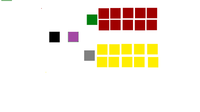
The Shorewellese Empire is fully defined as a federal semi-constitutional monarchy, in which the monarch is the head of state and the Grand Vizier acts as the appointed head of government. As defined by the constitution, which was ratified and came into force on 18 May 2016 (the day the Empire was founded), executive power is exercised by His Imperial Majesty's Government, on behalf of and by the consent of the sovereign, primarily by the Parliament and Privy Council and its subordinate agencies. Legislative power is vested in the Parliament of Shorewell. The judiciary is a unique combination of the Crown, HIM's Government, and Parliament of Shorewell.
The Shorewellese Monarch, presently Sultan Bilal I, is the Chief of State of the Empire. By virtue of this position, the Crown is the wellspring of all executive power over the Government and the regions guaranteed by it. These powers are known as imperial prerogative, and can be utilized for any purpose, however the current monarch tends to appoint these powers to other agencies of the government.
The Head of Government is the Grand Vizier, who is currently Maaz Munawar. As the Head of Government, the Grand Vizier exercises control over the government, in areas allowed to him by the Monarch—who, as Head of State, retains most of the government's power and authority. The Grand Vizier, despite being classified as the head of government, can not speak on behalf of the Empire internationally, nor within the government without the Monarch's approval. The Grand Vizier is elected by the people and approved by the Monarch, or otherwise appointed to the position outright in case of a lack of suitable candidates.
The Parliament of Shorewell, also known as the General Assembly, is the branch of government with which legislative power resides in the Shorewellese Empire. It is a bicameral legislature, comprised of elected officials from each apportioned region of the country in the chamber and people chosen by the monarch in the senate. The monarch presides over the Grand Vizier, who subsequently presides over the General Assembly. The Senate consists of a small group of advisers appointed by the Monarch to assist in drafting laws. Senators discuss and vote with the monarch on important matters and guide the monarch to make appropriate decisions. The Senate serves as a House in the General Assembly and votes directly on its matters. The Senate's main leading figure is the President of the Senate—who, like the other members of the Senate, is also appointed by the Monarch. The Chamber of Deputies consists of a group of lawmakers who are elected to their post by the people. Deputies discuss and vote with the monarch on important matters for the nation. The Chamber serves as a House in Parliament and votes directly on its matters. The Chamber's main leading figure is the President of the Chamber.
Sultan and Council of Ministers

The Sultan is the head of both the moderating and executive branches (being aided by the Council of State and Parliament); he had the final say and held ultimate control over the national government. He is tasked with ensuring national independence and stability. The Constitution gave him moderate amount of avenues for imposing his will upon the General Assembly. His main recourse is the right to amplify legislative sessions.. In the Senate, a sovereign's power to choose senators did not really give him included influence since legislators couldn't without much of a stretch be expelled subsequent to being affirmed to their separate position. On those events when the Chamber of Deputies was broken up, new decisions were required to be held promptly and the new Chamber situated.
The Government practices its executive authority through various government offices. A division is made out of utilized authorities, known as government workers, and is politically responsible through a minister or secretary. A secretary, who sits in the bureau, and ordinarily bolstered by a group of junior clergymen. Ministerial offices are driven politically by an administration serve, ordinarily an individual from the bureau and cover matters that require coordinate political oversight. For most divisions, the administration serve being referred to is known as the secretary of his or her separate office. He or she is by and large bolstered by a group of junior priests and a delegate secretary. The regulatory administration of an office is driven by a senior government employee, known as a secretary. Subordinate to these pastoral divisions are official offices. An executive has a level of self-governance to play out an operational capacity and answer to at least one particular government offices, which will set the financing and vital arrangement for the agency.
Ministers include members of the various departments of the executive branch of the government which are as follows: Department for Agriculture, Bank of Shorewell and Export Finance Board, Department for Business, Innovation, and Skills, Department of Climate Change, Department for Communities and Local Government, Department for Culture, Media and Sports, Department of Defense, Department for Environment, Food and Rural Affairs, Department for Foreign Relations, Department for Health and Human Services, and Department for Work and Pensions. All ministries report directly to the Sultan, who oversees the functions of all of them and maintains the responsibility of ensuring the various agencies being free of legislative, judicial, and executive branch's power or influence.
Imperial Family
The Imperial Family of Shorewell was established by its current Monarch, the Sultan of Shorewell, as well as the Sultan Grandfather. At first, the Imperial family was to be the offspring from the future consort of the Sultan. However, later questions were made on the legitimacy of the Sultan's right to rule and if it should pass to the Sultan Grandfather. Due to the involvement of the Sultan Grandfather Yaqoob in the founding of Shorewell as well as being the family's patriarch, it was decided that his progeny would be imperials. The line of succession shall be put into place when the Sultan has children. For now, the Heir to the throne is a closely related Imperial chosen by the monarch, which currently is Crown Prince Humza.
Currently, Sultan Bilal I, Sultana Mother Aneela, and Sultan Grandfather Yaqoob may be addressed as His or Her Imperial Majesty (HIM), while their consorts may be addressed as His or Her Majesty (HM). All Princes and Princesses born into the Imperial family may be addressed as His or Her Imperial Highness (HIH), while their consorts may be addressed as His or Her Highness (HH).
Though Shorewell is a constitutional monarchy, the Imperial Family of Shorewell is the leading house of the nation and have the utmost amount of power with very few limitations. Unlike any other noble, chivalric, or peerage title within the nation, the official titles of the Imperial family hold meaning and power. The Monarch possesses full power and can carry out his will with impunity. The Consort possess similar authority, but must submit to the Monarch's will if the latter disagrees with their actions.
Any parents of the monarch are entitled to supreme rights in their own right over the nation. However, like the Consort, they must ultimately submit to the will of the Monarch. Any prince or princess, regardless of being a blood relative to the Monarch, have equal authority with each other, and can exercise their will largely as they see fit. However, they too must accept the will of the Monarch, the Imperial Consort, or the parents of the Monarch. No member of the Imperial family may sign an official document on any matter without the Monarch's consent. The consort and parents of the Monarch have equal privileges and rights, while the princes and princesses are placed below them in imperial rank.
Armed Forces

The Armed Forces of Shorewell consist of all the military units along with their commanders of the Shorewellese Empire With the foundation of the nation, the Armed Forces were established for national defense and other military endeavors. Since most military operations micronationally can not be conducted, the Shorewellese Armed Forces remain more ceremonial and are there for the protection of the country in the event it is in danger. Overall, the use of the armed forces internationally remains low, but they strictly enforce laws within their borders. The Imperial Guard, however, is a branch of the Armed Forces which is devoted to security of the Sultan of Shorewell, the Imperial Family, imperial residences and other crown properties. In addition, the guard remains as one of many agencies that protects the capital of the empire, Shehzadam.
The military is organised along similar lines to other military forces of developing nations, in which a little standing armed force can rapidly enlarge its quality amid crises from a save local army drive (in Shorewell, the Imperial Guard). Shorewell's first line of guard depends upon a substantial and effective army to defend against outside assault. As an issue of approach, the military is completely obedient to non military personnel administrative control and to stay at a careful distance from inclusion in political choices. Military faculty are permitted to keep running for and serve in political office while remaining on active duty. In any case, they don't represent the Army, Navy, or the Air Force, but are instead expected to serve the interests of the city or province which had elected them.
The Armed Forces of Shorewell were created in the aftermath of Independence. They originally compromised of the Sultan and his supporters when they sought for independence, and after the foundation of the empire, a permanent standing military force was created which has served till today.
Foreign relations
Foreign relations, being a vital source for the prosperity of a nation, were conducted and formed through diplomatic talks immediately after the empire's foundation with other nations. In the months following the start of Shorewell, the Parliament issued many times statements regarding the tightening of policies, requirements, and needs for diplomatic relations with other nation. Currently, diplomatic relations are only established on four levels. An alliance, non-aggression, and mutual recognition can only be granted through a signing of a treaty. However, the Empire does grant state of friendships with other nations without the signing of a treaty, usually conducted through a declaration.
The Shorewellese Foreign policy is a multitude of ideas and precedents set by the Monarch and government. It is rendered to be a rather strict policy by some, as it contains the ideology of domestic interests before international interests. Additionally, Shorewell is well-known to not grant alliances without a heavy interest or cooperation agreement with another nation. Mutual recognition is established with a variety of micronations, however, the nation must be deemed well established and well-off in diplomatic affairs.
Imperium is considered the possession of the imperial rank of Emperors. The Shorewellese Imperium ideology holds elevated view of the Emperor, as it finds that all Emperors should be able to trace recognition of their imperial rank from the Roman Emperors. Shorewellese Foreign policy heavily revolves Imperium and the method of recognizing other Imperial ranks. Multiple treaties have been signed with nations that claim to have Emperors, however, provisions of Shorewell recognizing the said status have not been commonly instituted, thus not granting recognition of the imperial rank even if the signatories are addressed as emperor's for the sake of protocol.
Economy
Currency
Shorewell's official currency since its foundation has been and is the Shorewellese Dinar. Common uses of the currency include hiring people for jobs, buying products, and conducting trade. The currency as of now remains only in an online digital format, with hopes from the Imperial government to be able to print bills in the near future. In terms of value, the Dinar is relatively low, as the exchnage rate with the United States dollar is 1 dollar for 7007.34285714 Dinar.
Banking system

The Bank of Shorewell and Export Finance Board is the body of the Shorewellese Government designed to liaise with the Bank of Shorewell, the national bank of Shorewell - as the bank is owned privately by stockholders (most notably the Shorewellese Government), it is just halfway responsible to the administration, albeit through the board it goes about as if it were a nationalized attempt. The board is additionally in charge of profiting the Shorewellese economy by helping exporters of Shorewellese merchandise and administrations to win business, and Shorewellese firms to contribute abroad, by giving assurances, protection and reinsurance against misfortune, considering the Shorewellese Government's more extensive global approach motivation.
The biggest part of the Board's exercises includes endorsing long haul advances to bolster the offer of capital merchandise, essentially for the fare apparatus and administrations; it helps Shorewellese organizations partake in major abroad activities, for example, the development of figures and structures. The Export Finance Board gives an assortment of advance, surety, and protection items planned to help the fare of Shorewellese merchandise and administrations. The mission of the Board is to make and support Shorewellese occupations by financing offers of Shorewellese fares to universal purchasers.
The Board likewise attempts to make Shorewell an alluring investment atmosphere for different organizations to move to. This incorporates, among general work, for example, advertising and evacuating/including direction, working with the Bank of Shorewell to enhance the nature of Shorewell's monetary and financial system, for example, funding the Shorewell Stock Exchange, and attempting to build the force of the Shorewellese economy. On August 20, 2016, the Board announced that the Shorewellese Dinar shall be backed up by gold and silver as to ensure no inflation and pointless money for it leads to an economic downfall and crisis. The Board is looking through the amount of gold and silver Shorewell has to back up the currency and will accordingly see the measures of how currency will be distributed and bank account management. The Board is in charge of overseeing correspondences between the Council and its national bank, the Bank of Shorewell. The division has no official offices, albeit through its tendency it liaises with numerous privately owned businesses.
Development
The Economy of the Shorewellese Empire is highly undeveloped and relies heavily upon the Economy of the United States. There are currently very few imposed regulations on the Shorewellese economy and only several businesses operate there. Important sectors of this economy include agricultural production and trade, along with other industries such as tourism, trade, and manufacturing. While there are several industries operating in Shorewell, most of them do not export their products, and those that do are usually given away for free. Currently, only the food and agricultural industries are able to provide money to the Empire. The Empire is totally dependent to the United States for assets and products. Most sustenance, utilities, fuel, attire and general products are foreign. These are paid for with cash earned through vocation in the US, implying that the whole economy of Shorewell relies on upon that of the US. This has all amounted to a GDP of 1,545,119,100 Dinar, subsequently maintaining a high unemployment rate of 21.05 percent.
Geography
Administrative divisions
Constituent states
Shorewell is comprised of nine separate pieces of land. The eight populated constituent states - Khimena, Kansabirea, Vansha, Firfoosha, Hashooma, Esterem, Elzira, and Xazon - all consist of residential properties. The last piece considered to be a part of the Empire is the seat of the government itself and its ruling dynasty, the Crownlands. Shorewell is divided into states, which are divided in cities, which are divided into towns. Each state obtains an elected representative to the Chamber of Deputies, based upon the population of the said state, and another representative in the Senate who is the federal monarch themself.
By constitutional convention, all states possess autonomy to control their own affairs, with the exception of national restrictions and powers held by the imperial government, like foreign affairs. The regions closer to Shehzadam, on the other hand, are much more autonomous due to the Sultan himself overseeing day to day affairs of the capital, and although they are still subjected to the Empire's law and government, they are generally viewed as self-reliant portions of the empire.
Princely states
On the 29th of June, 2018, the Parliament passed a bill known as the Princely States Act, an act which enabled independent nations to sign an Instrument of Accession and become princely states within the Sultanate. The first to sign on to such an agreement was the Kingdom of Cottonwood, followed shortly after by the Principality of Elenora, both of whom were former protected states of Shorewell. Following their accession, the states transformed their monarchical and political structure into that of a princely states.
| Flag | State | Head of state |
|---|---|---|
| Princess Ava Neasa | ||

|
Prince Anthony Clark |
Climate
The various territories of the empire are generally considered to have a cold climate, with frequent rainfalls in the spring and summer seasons, and heavy blizzards landing in during the winter. The average temperature however remains to be about 48.2 °F (9 °C). As a result, the Department of Climate change works actively to ensure that pathways are cleaned up during the winter, and that a sudden change of temperature can be coped with by an average citizen.
The Department of Climate Change is the Shorewellese Government office in charge of Shorewell's green strategies, and for the advancement of reusing, environmentally friendly power vitality and protection of water and different assets. A portion of the work completed by the division incorporates participation with the Department for Transport on street upkeep - which for the most part includes litter picking - and on expanding the utilization of reusing and feasible energy by the administration and organizations of Shorewell.
| Climate data for Shorewell | |||||||||||||
|---|---|---|---|---|---|---|---|---|---|---|---|---|---|
| Month | Jan | Feb | Mar | Apr | May | Jun | Jul | Aug | Sep | Oct | Nov | Dec | Year |
| Average high °C (°F) | -0.555556 (30.999999) |
1.66667 (35.00001) |
7.22222 (45) |
15 (59) |
21.1111 (70) |
26.6667 (80.0001) |
28.3333 (82.9999) |
27.2222 (81) |
23.3333 (73.9999) |
16.1111 (61) |
8.88889 (48) |
1.66667 (35.00001) |
28.3333 (82.9999) |
| Average low °C (°F) | -8.88889 (16) |
-7.22222 (19) |
-3.33333 (26.00001) |
2.22222 (36) |
7.77778 (46) |
13.8889 (57) |
16.1111 (61) |
15 (59) |
10.5556 (51.0001) |
4.44444 (39.99999) |
-0.555556 (30.999999) |
-5.55556 (21.99999) |
−8.88889 (16) |
| Average Precipitation mm (inches) | 40.64 (1.6) |
48.26 (1.9) |
50.8 (2) |
73.66 (2.9) |
83.82 (3.3) |
86.36 (3.4) |
88.9 (3.5) |
76.2 (3) |
88.9 (3.5) |
68.58 (2.7) |
71.12 (2.8) |
48.26 (1.9) |
825.5 (32.5) |
| Source: Weather Channel | |||||||||||||
Culture
The Culture of Shorewell is the example of human action and imagery connected with the Shorewellese Empire and its kin. It is a principally Western culture vigorously affected by the culture of the United States and the culture of Pakistan, however by the by staying one of a kind to the individuals who distinguish as Shorewellese. It has been molded since the establishment of the Empire by the traditions, thoughts, and commitments of the individuals who have joined or been connected with Shorewell.
Media
On 1 August 2016, the Shorewellese Empire founded its first official newspaper called the Khabar Times. Khabar in Urdu, generically means news, so it literally translates as the News Times. Shorewell uses this Newspaper to convey the latest news in Shorewell to the public, and any other major events that take place that Parliament feels has some association, effect, or impact with Shorewell. The Khabar Times attempt to reveal the headline news of Shorewell continuously. There have been attempts to make a schedule of newspapers, but it has since its foundation remained in the status of making articles only when notable events arise. Other Media outlets such as a radio have been proposed and are being worked and thought upon. However for now, the Khabar Times Newspaper is the foremost national outlet of news in Shorewell along with the Latest in Shorewell thread in the Microwiki Forums.
Languages
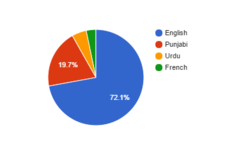
Both Punjabi and English are spoken as native languages within Shorewell. Most of the population either speaks English, Urdu, Punjabi, or Biljish. The Government uses Biljish and English as the nation's official and national languages, while Punjabi and Urdu are considered commonly spoken languages that are essential to the nation's culture and identity. The Arabic language is also used in various religious ceremonies, principally within Islam. Biljish however remains a unique language spoken and created within Shorewell, and is only understood by a minority of the population, largely in due to the fact that the language is still under construction.
English is the most commonly spoken language of Shorewell, and is its official language. All transactions, governmental affairs, business, etc. are conducted in English. On the other hand, Urdu is a frequently spoken language, with many books written in it (and being kept in the Library of Emeralds). A vast number of people in Shorewell can speak Urdu fluently, or have it as the mother tongue. Even with the considerable use of Urdu in Shorewell, the official language remains English to keep international affairs stable. Hand in hand, Arabic is occasionally spoken and learned throughout the Empire. However, the library oversees the administration of it due to the fact that many books and important texts are translated from Arabic to English.
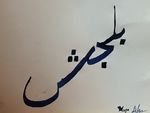
The Biljish language is the main conlang created and spoken in the Shorewellese Empire. It's local to the city of Shehzadam essentially. The language is a priori, implying that it was developed without taking components from another current language. It is spoken by the Shorewellese individuals of the area, and it is perceived as an official language of Shorewell alongside English. Its utilization is controlled by the Biljish Language Authority. It is evaluated that 3.125 percent of the number of inhabitants in Shorewell speak in any event fundamental Biljish because of the reality the language is still a work in progress. The main foundation to perceive and educate the Biljish language is the Biljish Linguistic Authority in Shorewell.
While Biljish serves as the primary and first conlag to be developed within the realm, having been brought into existence in mid-2016, there are other less known conlags used throughout Shorewell. Crycoon, a conlag spoken and developed primarily within Shehzadam, uses the Cryillic alphabet in its writing. The inner workings, laws, and grammar of the language is regulated by the Crycoon Linguistic Authority, a polity created at the Sultan's behest.
Religion

The Constitution of Shorewell guarantees freedom of religion, though all members of the Imperial family including the monarch profess the Islamic faith. The government protects religious freedoms, though Islam remains the most widespread and common religion of the empire. The second most practiced religion is Christianity, with the Catholic faith being the most popular among Shorewellese Christians. A small minority of the population also consider themselves Atheist or Irreligious, though they are considered different from nonpracticing members of other faiths. There are also small communities of Hindu adherents and followers of Krishna.
Islamic customs like the breaking and opening of fast are publicly hosted with feasts send through the Imperial family, along with the preformance of the Tarawih, a religious prayer conducted in intervals of two ten times after every Isha prayer in the month of Ramadan.
National symbols
The National symbols of Shorewell are things which are significant, agent or generally normal for Shorewell or Shorewellese culture. Some are built up, authority symbols; for instance, the Imperial Arms of Shorewell, which has been classified in heraldry. Different images might not have official status, for some reason, however are in like manner perceived at a national or global level.
The National flag of Shorewell is the flag used to portray the nation and its citizens. The Flag was designed by the first and current monarch of Shorewell, Bilal I.The Flag has never been used in the actual physical sense due to it only being available currently online. There are future goals that once the flag can be held physically, it should be put in the Royal Residence in Shehzadam at all times with a few exceptions. If there is a public mourning or sad event, the flag will be lowered down to half its original height.
The Coat of Arms was created on 18 May 2016. The shield in the center of the coat of arms is unified, in the same design as the Emblem of Saudi Arabia. The two swords represent the Empire and it's two main divisions, the Emirate of Shehzadam and the rest of the Empire are comprised of the Shorewellese Star. The Coat of Arms shows up on government archives, political missions, and additionally a few Shorewellese Flags. It is decorated in gold on the banner of the Armed Forces of Shorewell (which is likewise the Empire's war ensign), and on the lower derrick of the Imperial Standard. The last is basically the national banner with the additional Coat of Arms in gold, which is set in the lower part of the (left-confronting) hoist and not in the canton as with other royal gauges. The Coat of Arms lower position is in regard to the sacrosanct way of the Shahada, the Islamic creed.
-
National animal
Cuisine

With diversity as different as its general public, dietary patterns endure coordinate impact of Indian sub-continential cooking. It comprises of extraordinary delights from all of Europe and after that common Indo-Pakistani style Chicken Biryani and Chicken Tikka Masala with Tandoori Naan. The Shorewellese cooking is set apart by the prominent utilization of meat and rice in large portions of its conventional dishes. Normally, Shorewellese feast upon rice joined by beans, very fluctuated green plate of mixed greens, and meat and eggs. A famous dish is Biryani, particularly Chicken, presented with mint and with lemon. In Shehzadam, prominent dishes incorporate Chicken Tikka Masala, Aloo Gosh, pizza, flapjacks, furthermore the utilization of desserts, for example, cakes and pies, all enlivened by the European and Pakistani propensities for the tenants of the capital.
A common element of Shorewellese cuisine is Sahrawi tea, a type of mint tea with origins in Morocco. The original form is drank throughout the capital and surrounding territories, though it is concluded by many that the farther you go from Shehzadam, the variety of the tea changes, usually to a form of Turkish tea, which is traditionally served in a glass atop a small saucer.
Literature
Shorewellese literature can be categorized by langauge: English literature, Urdu literature, and Arabic literature. Literature in Shorewell started to bloom in 2017, when it became popular to write poems in any of the Empire's conlangs, though the concept has been dated back to the foundation of Shorewell itself. Shehzadam in of itself is considered the major hub and meeting point of various works, with many having been published as well.
English literature is commonly based around the diverse styles of poetry, memoirs, and short stories that have been developed by the Sultan, including various works devoted to family members, and cultural aspects of society. Urdu literature primary focuses upon poetry, and the development of poems that have a metaphorical meaning to explain distinct natural and unnatural events in the universe.
Visual arts
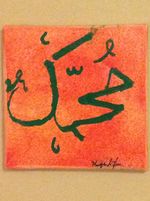
Shorewell has a long-standing convention of favoring aesthetics other cultural viewpoints. The Shorewellese configuration firm, yet not the most progressive in computerized expressions, stays consistent with social conventions in different types of craftsmanship and is regarded in the MicroWiki Sector for such. Painting and calligraphy, especially, are a trademark attribute of the way of life of Humbro, where these expressions have succeeded both prior and then afterward the establishment of Shorewell, when the said region turned out to be a piece of the Empire.
The most punctual styles of Humbro painting date from the time when individual talented craftsmen polished there exchange for a winning and displayed it to different outsiders and specialists. In the wake of turning into a piece of Shorewell, the Empire has progressed upon such a quality by having moved from straightforward compositions to cutting edge calligraphy and mosaics. In this sense, the landing of such abilities to Shorewell has spoken to synchronization and modernization in Humbro workmanship, which has now turned out to be typical of all of Shorewell.
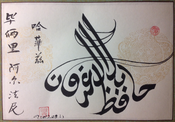
The monarch traditionally also commissions a Tughra, a unique calligraphic monogram that is attached to all official signatures or documents, for themselves that is to be used throughout state related posts and functions. Tughra's remain a very elaborate and unique symbol of the Sultan's personage, and establish a unique personal identity of the monarch. The current Tughra in use was produced on the 23 September 2017 with the help of a well-renowned artist.
Holidays
Shorewell counts with a varied range of holidays, festivals and celebrations. Most Shorewellese holidays are of either Islamic or Western origin, but many other minor Islamic holidays are observed my Muslims along with minor Christian holidays being observed by Christians. The following are national holidays of Shorewell that help to inspire the Shorewellese people to celebrate their unique culture and diversity. Only the two Eid's and Foundation day are official national holidays of the Empire, with the rest being holidays commonly celebrated by the citizens of Shorewell.
| Name | Date | Notes |
|---|---|---|
| Eid al-Fitr | Decided by Moon sighting (Estimated to 25 June) | The first day of Shawwal in the Islamic lunar calendar. It marks the end of Ramadan. |
| Eid al-Adha | Decided by Moon sighting (Estimated to 1 September) | Marks the end of the 10 day Hajj pilgrimage to Makkah. |
| New Year's Day | 1 January | The first day of the Gregorian year. |
| International Women's Day | 8 March | Celebration of respect, appreciation, and love towards women. |
| International Workers' Day | 1 May | Honors the the contributions that workers have made to the strength, prosperity, and well-being of the country. |
| Foundation Day | 18 May | Foundation of the Shorewellese Empire along with its national symbols, constitution, parliament, etc. |
| Children’s Day | 12 October | Honor children, promote mutual exchange and understanding among children and initiate actions to benefit and promote the welfare of the world's children. |
| Teacher’s Day | 15 October | Special day for the appreciation of teachers and their special contributions to the society. |
| Armistice Day | 11 November | Commemoration of the armistice signed between the Allies of World War I and Germany and also in commemoration of both living and dead soldiers who served in any conflict. |
| New Year's Eve | 31 December | The final day of the Gregorian year. |
